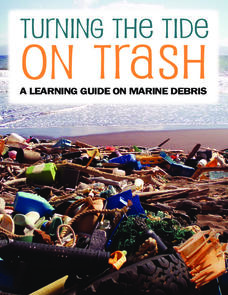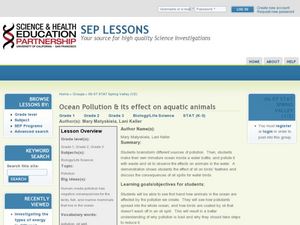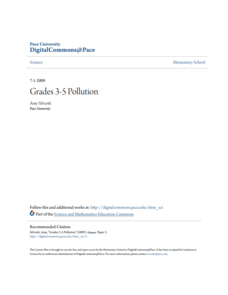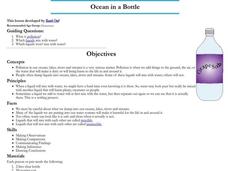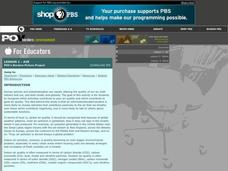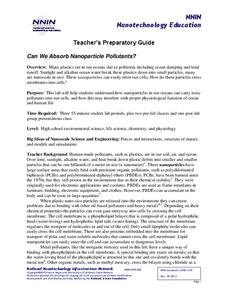Curated OER
Ocean Pollution
Students explore ocean pollution. In this ecology lesson, students view a video entitled This Pretty Planet and identify common biodegradable products. Students participate in activities designed to simulate the negative effects of...
NOAA
Turning the Tide on Trash: A Learning Guide on Marine Debris
The lessons in this learning guide are designed to increase youngsters' awareness of the impacts of marine debris and to teach them about pollution prevention techniques. This fabulous, 30-page packet is chock full of important...
Curated OER
Ocean Pollution & its Effect on Aquatic Animals
Students consider the concept of ocean pollution. In this ocean lesson, students participate in a hands-on demonstration in order to replicate an oil spill and its effects on marine life.
Wilderness Classroom
Pollution
Educate scholars on pollution—air, water, and land—with a series of lessons that begin with a thorough explanation of each type. Learners then take part in three activities to reinforce the importance of reducing pollution. They...
NOAA
Build Your Own Ocean Ecosystem
Hold the sea in the palm of your hand! Amateur oceanographers work together to create models of an ocean ecosystem in the sixth and final installment in a series. Raise awareness of global ocean health issues through guided research,...
Pace University
Pollution
Over the course of 10 days, scholars take a pre-assessment to place them in one of three leveled groups. Whole-class and in small groups, pupils take part in read-alouds, field trips, hands-on activities, and complete learning contracts...
National Nanotechnology Infrastructure Network
How Can Nanoparticles Move from Land to Ocean?
Investigate the migration of the nanoparticle from land to water! A lab investigation asks budding scientists to simulate runoff. Testing water samples before and after the simulation leads individuals to make conclusions about pollution...
Curated OER
Ocean in a Bottle
Learners investigate pollution in water. In this pollution lesson plan, students participate in an experiment to simulate water pollution. Learners observe how the water reacts to the "pollution."
Bonneville
The Problem of Plastic Trash Islands
Trash collection can be a hassle, especially out in the ocean. The second of four parts in the Adrift in a Sea of Plastic unit has pupils research plastic trash islands in marine ecosystems. They investigate why they occur and potential...
Marine Institute
Water Pollution
Sixth graders investigate the various types of pollutants found in water and ways to help prevent water pollution. Through a hands-on experiment, students create samples of polluted water by mixing water with vegetable oil, dirt, and...
Curated OER
Pollution Solutions
Learners explore the role of chemicals in the pollution and destruction of ecosystems. They research factors that affect ecosystems and the methods being employed to counter them. In addition, they choose one water ecosystem that has...
Curated OER
Oceanic Absorption- Oceanic Sequestration
Students examine the different techniques that may be used to reduce carbon dioxide in the atmosphere. In this ocean pollution instructional activity students divide into groups and complete a lab to see how the ocean holds carbon dioxide.
NOAA
Off Base
How does carbon dioxide affect the world's oceans? The final installment in a series of six lessons has pupils research ocean acidification, then conduct an experiment to witness the delicate balance that exists in our seas. Materials...
Curated OER
Turning the Tide on Trash: Marine Debris Curriculum
Seven pages of fascinating reading on marine debris preface the activities in this lesson plan. Four different activities are employed to simulate how the debris is distributed in the ocean and along beaches. Early ecology learners...
Curated OER
P.O.V.'s Borders Picture Project: Lesson 1 - Air
Take photos of human activities that impact air quality. Collaborative groups present one of the photographs, identifying how the activity contributes to air quality and what can be done to minimize the impact. As one in a series of...
Curated OER
Oil on the Beach
Students explore how oil pollutes the oceans. In this science lesson, students investigate various materials that could be used to clean up an oil spill. Students discuss which materials worked best and how humans can reduce oil spills.
Curated OER
Oceans and Coasts
Young scholars explore the topic of marine pollution. They define key vocabulary words, list examples of marine pollution, complete a true/false handout, read an article, and participate in a class discussion.
Curated OER
Rubber Duckies and Ocean Currents
Students explore marine life by conducting a rubber duck experiment. In this water currents lesson plan, students practice identifying latitude and longitude coordinates on a map and define the currents of major oceans. Students discuss...
Curated OER
The Water Cycle and Sources of Pollution
Students make an island that has a construction site on it. They spill siulated pollution and trash on top of the island and then water it to simulate rain. They will observe how the rain washes dirt, sand, and pollution off the island...
Curated OER
Air: Air Quality Picture Project
Students recognize which activities contribute to poor air quality and which contribute to good air quality. They discover how air quality is measured, and come up with ways that humans can have a positive affect on air quality.
Curated OER
Nonpoint Source Pollution in Long Island Sound
Students examine and identify the types of nonpoint pollution on Long Island Sound. In groups, they walk the shoreline, collect trash and identify its source. Using that information, they create a variety of graphs of the different...
NOAA
Stressed Out!
Are our oceans really suffering due to the choices humans make? The sixth and final installment in the volume of activities challenges research groups to tackle one of six major topics that impact ocean health. After getting to the...
National Nanotechnology Infrastructure Network
Can We Absorb Nanoparticle Pollutants?
Just because we can't see it doesn't mean it isn't there! A growing concern for environmental scientists is toxic nanoparticles in our air and water. Young scholars conduct an experiment to demonstrate how these particles can cross our...
Curated OER
Down in the Dumps
After an introduction to municipal sludge, middle school ecologists consider the pros and cons of dumping in the Hudson River Canyon. The class is split into two groups: one to debate in favor or dumping and one to debate against the...
Other popular searches
- Art Ocean Pollution
- Effects of Ocean Pollution
- Ocean Pollution and Plastics
- Ocean Pollution Lessons
- Ocean Pollution Laws
- Technology Ocean Pollution
- Ocean Pollution Worksheet
- Photography Ocean Pollution
- Food Chain Ocean Pollution
- Water Pollution Ocean Debris
- Pollution Ocean
- Land and Ocean Pollution



